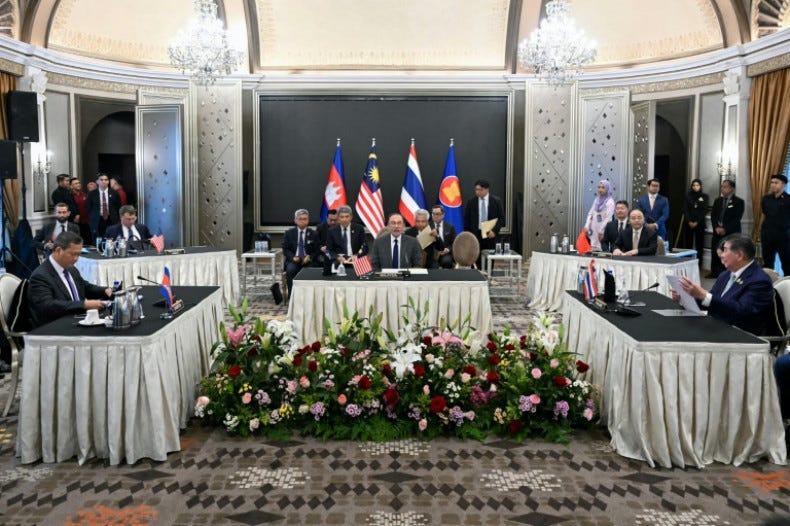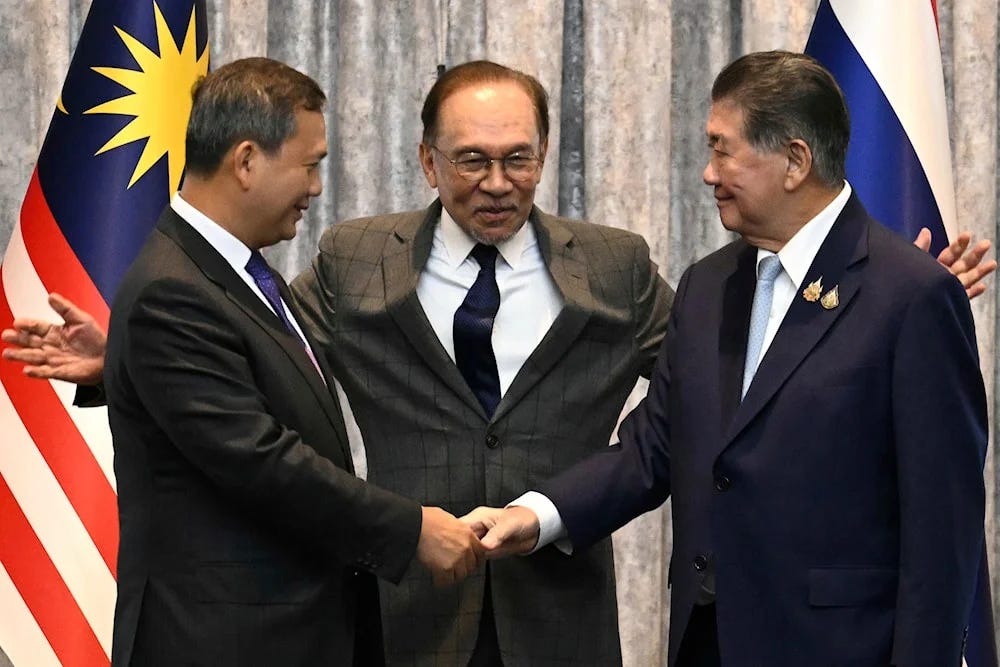Thailand and Cambodia Agree to Ceasefire, Effective Today
China also played a role in the negotiations, with the joint statement noting its "active participation." The talks were hosted by Malaysian Prime Minister and ASEAN bloc chair Anwar Ibrahim
Cambodia-Thailand, PUREWILAYAH.COM - A truce agreement between Thailand and Cambodia came into effect in the early hours of Tuesday, testing whether it will halt five days of open combat that have engulfed their jungle-clad frontier.
Both sides agreed that an "unconditional" ceasefire would start at midnight on Monday to end the violent clashes over a handful of ancient temples in disputed zones along their 800-kilometre border.
In the Cambodian city of Samraong — located approximately 20 kilometres from the border — an AFP journalist reported a steady drumbeat of artillery strikes throughout Monday, which ceased in the 30 minutes leading up to the ceasefire deadline.
Dozens Killed and Hundreds of Thousands Displaced
Since Thursday, the conflict has seen jets, rockets, and artillery fire result in the deaths of at least 38 people and the displacement of nearly 300,000 civilians.
The violence has prompted international concern, including direct intervention from U.S. President Donald Trump over the weekend.
This flare-up has been the deadliest since the sporadic clashes that occurred between 2008 and 2011, stemming from disputes over territory that both nations claim, largely due to ambiguous border demarcations set by French colonial authorities in 1907.
Next Steps in Peace Process
According to the peace deal, military commanders from both Thailand and Cambodia are scheduled to meet at 7 a.m. on Tuesday. A cross-border committee will also be convened in Cambodia later in the day to further ease tensions and reinforce commitments to peace.
"When I heard the news, I was so happy because I miss my home and my belongings that I left behind," said Phean Neth, a 45-year-old evacuee staying at a sprawling camp for displaced Cambodians near a temple far from the fighting. "I am so happy that I can't describe it."
Joint Statement Hails 'Vital First Step'
A joint statement issued by Thailand, Cambodia, and Malaysia — which hosted the peace negotiations — described the ceasefire as "a vital first step towards de-escalation and the restoration of peace and security."
Both Thailand and Cambodia have been seeking favorable trade deals with the United States to avoid the imposition of steep tariffs threatened by President Trump. The U.S. State Department confirmed that its officials had been "on the ground" during the peace talks.
China also played a role in the negotiations, with the joint statement noting its "active participation." The talks were hosted by Malaysian Prime Minister and ASEAN bloc chair Anwar Ibrahim in Putrajaya, the country’s administrative capital.
Cambodia's Prime Minister Hun Manet expressed gratitude to President Trump for his "decisive" support, while Thai Acting Prime Minister Phumtham Wechayachai emphasized that the agreement must be "carried out in good faith by both sides."
"If they say they'll stop firing, they must stop completely," said Prapakarn Samruamjit, a 43-year-old Thai evacuee in the city of Surin.
Border Remains Volatile Despite Ceasefire
Despite the ceasefire, the situation remains highly tense. On the eve of the agreement, Thailand's military accused Cambodian snipers of occupying one of the contested temple sites and claimed that Phnom Penh had surged additional troops along the border while firing rockets into Thai territory.
Fighting was reported in at least seven areas across the rural region, which features hilly terrain surrounded by dense jungle and farmland where locals cultivate rubber and rice.
President Trump, who has launched a broad campaign of global tariffs, has threatened both nations with high levies unless they agree to independent trade deals. However, he stated that he would "look forward" to signing agreements once "peace is at hand."
Accusations and Rising Nationalism
Although both sides had already agreed to a truce in principle, each accused the other of sabotaging peace efforts. There were mutual allegations of the use of cluster munitions and the targeting of civilian infrastructure, including hospitals.
Thailand reported that 11 of its soldiers and 14 civilians have been killed in the recent fighting. Cambodia has confirmed eight civilian and five military deaths. The Thai military also stated that it had returned the bodies of 12 Cambodian soldiers killed in action.
More than 138,000 people have fled Thai border regions, while approximately 140,000 have been displaced within Cambodia. The conflict has stirred nationalist sentiment in both countries.
Thai authorities have urged citizens to "refrain from any kind of violence, whether in speech or action," particularly toward Cambodian migrants living within Thailand, in an effort to prevent the conflict from sparking domestic unrest. (PW)
Source: Bangkok Post



